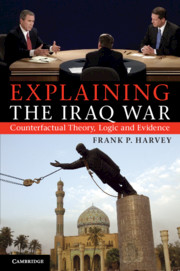Book contents
- Frontmatter
- Contents
- Figures
- Tables
- Acknowledgments
- Introduction
- 1 Comparative counterfactual analysis and the 2003 Iraq war
- 2 Leadership, political context(s) and the Iraq war
- 3 Democratic national security advisers
- 4 Domestic and congressional politics
- 5 American intelligence failures and miscalculations
- 6 Societal pressures and public opinion
- 7 International politics, global WMD consensus and UN power balancing
- 8 Hussein’s mistakes, miscalculations and misperceptions
- 9 Summary and implications
- 10 Conclusion
- Bibliography
- Index
1 - Comparative counterfactual analysis and the 2003 Iraq war
Published online by Cambridge University Press: 05 June 2012
- Frontmatter
- Contents
- Figures
- Tables
- Acknowledgments
- Introduction
- 1 Comparative counterfactual analysis and the 2003 Iraq war
- 2 Leadership, political context(s) and the Iraq war
- 3 Democratic national security advisers
- 4 Domestic and congressional politics
- 5 American intelligence failures and miscalculations
- 6 Societal pressures and public opinion
- 7 International politics, global WMD consensus and UN power balancing
- 8 Hussein’s mistakes, miscalculations and misperceptions
- 9 Summary and implications
- 10 Conclusion
- Bibliography
- Index
Summary
The value of counterfactual historical analysis
Counterfactual historical analysis is regarded across multiple disciplines as a powerful tool for evaluating popular accounts of major events in history, or for testing different theories scholars offer to resolve questions about causation – but it only works if it is done well. Lebow (2006: 4) describes counterfactuals as
past conditionals or, more colloquially, “what if” statements about the past. They alter some aspect of the past (e.g., doing away with a person or event, changing a critical decision or outcome, inserting an event or development that never happened, or making it take place sooner or later than it did), to set the stage for a “what might have been” argument … They entail small, plausible changes in reality that do not violate our understanding of what was technologically, culturally, temporally or otherwise possible.
The method has been used by prominent scholars to weigh competing explanations for world wars, the end of the Cold War, the escalation of contemporary international crises and many other transformative events in world history. “Good counterfactual thought experiments,” Lebow (2000: 555) reminds us, “differ little from ‘factual’ modes of historical reconstruction [and] are an essential ingredient of scholarship. They help determine the research questions we deem important and the answers we find to them. They are necessary to evaluate the political, economic, and moral benefits of real-world outcomes. These evaluations in turn help drive future research.” Contrary to popular assumptions, there is no significant (or theoretically relevant) distinction between factual and counterfactual reasoning; both dimensions of any explanation must be processed for a credible theory to emerge. Whenever we isolate what we believe to be an important cause of some act or event, the validity of that claim demands simultaneous exposure to some counterfactual proof that, in the absence of these conditions, the event would not have occurred. As Lebow (2000: 556) explains:
Any sharp distinction between factuals and counterfactuals rests on questionable ontological claims. Many of the scholars who dismiss counterfactual arguments do so because they do not believe they are based on facts … Even when evidence is meager or absent, the difference between counterfactual and “factual” history may still be marginal. Documents are rarely “smoking guns” that allow researchers to establish motives or causes beyond a reasonable doubt. Actors only occasionally leave evidence about their motives, and historians rarely accept such testimony at face value. More often historians infer motives from what they know about actors’ personalities and goals, their past behavior and the constraints under which they operated.
Testing counterfactuals is essentially what we do as social scientists – we change a variable and track its relative impact on outcomes in our search for necessary and/or sufficient causes. Consequently, each contribution to the literature on the Iraq war is based on both ‘factual’ and ‘counterfactual’ claims. For example, every book supporting the Bush-neocon-war theory (almost all of them) requires that we accept as ‘fact’ the Gore-peace counterfactual – both parts of the argument (as with any causal claim) are inseparable, because you can’t accept the validity of one (neoconism) without simultaneously requiring the validity of the other (Gore-peace).
- Type
- Chapter
- Information
- Explaining the Iraq WarCounterfactual Theory, Logic and Evidence, pp. 23 - 39Publisher: Cambridge University PressPrint publication year: 2011
- 1
- Cited by



